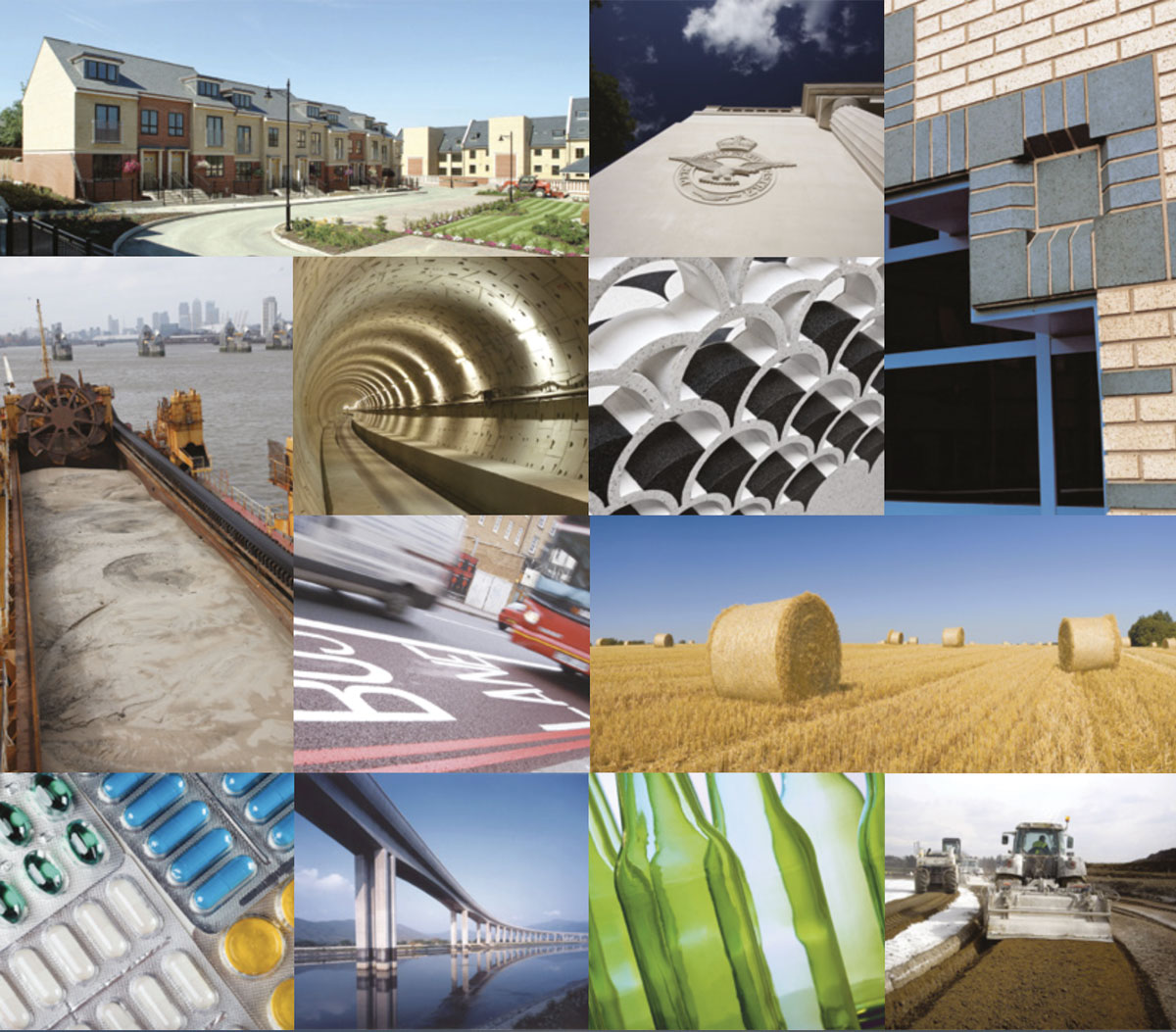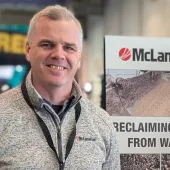Industry to Stand Up and Advocate the Value of Business

First published in the June 2021 issue of Quarry Management as Green Pickle, With Added Spice
Enough is enough: it is time for industry to stand up, be proud, be counted and challenge more, says Nigel Jackson, chief executive of the Mineral Products Association
Get the recipe wrong and green pickle will make you grimace and your eyes water. I feel much the same about the rising rhetoric of those late to the global warming debate who think that by shouting loudly, sounding greener or adopting ever more unachievable target dates to achieve net zero proves their environmental sincerity. We have no time for yet more signalling; the only show in town now is delivery. If it is not actual mitigation, adaptation or innovation, stop talking. Given the high risk of failing to mitigate sufficiently and rapidly enough, maybe homo sapiens should be asserting less while doing more of what it does best by investing and adapting faster into more hard solutions in the built environment.
It is heartening, therefore, that Bill Gates says out loud what those of us who are committed to actual delivery already know. Transitioning – repeat, transitioning – to a low-carbon economy will not be quick, cheap or easy. Doable, yes, if all the ‘ifs’ align, and we stick with them, and some prove to be winners, but that maybe the most ‘iffy’ of all conjectures. Those lucky enough to be able to commentate and opine without really doing much other than eat less meat, walk more, drive and fly less and replace their boiler feel good about it. You are doing the right thing, but be aware that it will be far from enough. Re-engineering total global production and rethinking consumption is not an academic or marginal task, it is about changing decades of the way we have chosen to live, particularly in the West and larger economies.
My 30 years of environmental angst is now morphing into anger. The more intense the ‘zeroist’ rhetoric becomes, the riskier the outlook and the challenges that emerge. Pledges are cheap. Ludicrous misinformed protests in the wrong places add nothing to delivery nor does the wilful promulgation of false hopes which suggest that all we need to do is adopt net zero by say 2025 or 2030 as if there were a low-carbon button we can just press and all will be well. We are going to need a whole lot more candour and truth if we are going to really change our low-carbon trajectory. For example, we cannot continue to delude ourselves that we are cutting our carbon emissions by as much as we think by ignoring our consumption footprint whilst exporting our emissions overseas to still hang in our atmosphere. That really is an uncomfortable truth.
Celebrity advocates may induce warm feelings and stir passions but the time for all that has long passed. It is the ‘doers’, the engineers, technologists, operators and researchers who are innovating and delivering that are making change possible. There is cumulative progress but, broadly speaking, all the good that is happening locally is being outpaced by a global ‘worsening’. The mountain we are climbing is getting higher and steeper and our resources may not get us to the top in time.
The UK is talking a good game on climate change, but we are like the sub who comes on with a minute to play. We are ‘one percenters’. I have reasonable confidence that we can reduce our 1% of global carbon emissions to net zero by 2050, and the sooner the better. Our ‘global leadership’ may well influence other players, and I hope it does, but I doubt that in and of itself it will be enough to change the game; there are just too many other players often saying the right things but doing something different.
In spite of my anxieties, I believe we have turned a corner on raising awareness and increasing commitment and determination to respond to global warming in this country, albeit a generation too late. But we are still falling short on the strategic picture. We are not really addressing what drives demand and consumption; we are still focusing more on ‘end of pipe’. It is the producers who are getting the blame. The inextricable link to what drives demand is still not being made beyond the low-hanging fruit. The consumer is still getting an easy ride.
For example, there is uproar about a potential new coking coal mine in Cumbria. ‘Fossil fuels are bad; they emit carbon dioxide so it’s mad to open a new coal mine, particularly with COP26 looming, it makes us look like idiots’. Others say ‘but we need coking coal to make steel which we need to build our own EV cars and wind farms’. Others respond, ‘but most of the coal will be exported and technology will make the coal redundant anyway’. Some talk about ‘red walls and levelling up’.
The proposed mine will produce around 2.7 million tonnes of coal per annum. Global consumption over the last 10 years has exceeded a staggering 7 billion tonnes per annum and is likely to remain so for some time with production declines in the West being offset by increases in the East. With China accounting for roughly half of consumption, their journey to net zero looks the hardest of all and unless they succeed, we all have a problem. Clearly, there are complex issues of perspective and proportionality that must be addressed before you can evaluate the balance sheet of more specific project-related issues. Jeopardizing responsible jobs at home in favour of less-sustainable jobs elsewhere is potentially an act of self-harm, and whilst we should grow ‘green jobs’ we must be careful that we still do the right things for the right reasons.
In less than a year the Government simultaneously refused planning for a new opencast coal mine in the North East whilst deferring a new coal mine in the North West to the county council as it was a ‘local decision’. Odd. One would have hoped that there might be a strategic thread. Both projects are predicated on industrial use rather than power. Should both have been determined centrally, or both determined locally? In the light of obvious political pressures, Cumbria County Council subsequently decided to revisit its decision. Then, most recently, the Government has had a rethink of its own and stepped in, and has bought itself time to either refuse the application before COP26 or defer any decision until well after.
Worryingly, the only supportive voices have been from the local area. I did wonder when the industries that would benefit from a local source of a key commodity might speak out, but they never did. The potato is too hot. Get used to it; this kind of conundrum is going to be commonplace in future. As county and district councils declare ‘climate emergencies’ they move ever closer to carbon intolerance and risk forgetting the ‘net’ in ‘net zero’. We bemoan the rigours of a slow and increasingly creaky mineral planning system now, but these will seem like the good old days in a few years’ time as some form of carbon balance sheet for new applications will doubtless emerge. It may well have to if only to allow evidence to be tested to counterbalance knee-jerk political reactions fuelled by social media.
The Cumbrian project is something of a test case, raising questions about how we intend to meet all of our primary resource needs sustainably. Currently, the ire is only directed at the obvious heavy industrial projects, whether it is a temporary mine or more permanent infrastructure, such as a road, railway or runway.
Apparently, we are less anxious about an Amazon distribution centre, a supermarket, fast-food chains, forestry and agriculture. They appear to be ok. In reality they are no more or less ok than any other activity, but attract less concern because we do not compare all activities rigorously or comparatively over their whole lives. We do not make the link between need and impacts in any strategic way. We do not look at whole-life costs and benefits. We do not know what to subsidise or tax based on any common approach; we go for easy targets with popular appeal. Why not a burger tax, pesticides tax, timber tax, Bitcoin tax and an online shopping tax?
Professor Dasgupta’s recent report on biodiversity argues in favour of including the value of nature within our economic model, linking economic outputs with the natural inputs upon which our economy relies. Quite right. But do we ever really and properly value a sewer, a road, a bridge, a tunnel, a reservoir, assets which connect us and keep us healthy? We know the cost but not the value. We really do need a better balance sheet and scorecard to judge ourselves by.
As an industry we know that our ‘amazing material: concrete’ (Bill Gates, February 2021) is responsible for 1.5% of UK carbon emissions, but we also know that we have reduced those emissions by 53% since 1990 (faster than the economy as a whole). We also know that the use of this most essential of man-made materials provides the very fabric and foundation of our built environment, both onshore and offshore, above ground, on the ground and below the ground. Concrete and cement are taking criticism globally because of their carbon emissions as if the industry was unaware, in spite of tremendous improvements that have been made over the decades and will continue to be made. Fortunately, there are those bold enough to realize that the world’s most sought-after man-made material is in demand because of its outstanding and versatile properties which help civilize our way of life; after all, it is not essential by accident. All consumption creates environmental costs, consequences and benefits. These considerations need balancing as a suite and not in a fragmented way.
We are not having the ‘complete’ debate yet. We are still looking mainly at ‘end of pipe’. The question should be ‘why the pipe?’. Until we can create a strategic valuation approach which links economics, environmental and social issues together for the whole economy, we will continue to lurch between each pillar depending on what suits us best at the time. In truth, we have not applied the principles of sustainable development rigorously enough at a national level across all sectors to enable us to evaluate the bigger picture. It makes it easier to oppose individual developments in a detached and often populist way.
How on earth do we expect a typical planning committee to understand all this without greater weight being given to the need for minerals? A national statement of need remains urgently required, as set out in the UK Minerals Strategy and has been argued for by the MPA and the CBI Minerals Group since its launch and recognition by Government in 2018.
If we want to transition from carbon to electron by converting cars to be fuelled by batteries, we had better accept that we need steel, lithium and other raw materials that have to be ‘hewn’ from somewhere. We had better be sure we can get them safely and sustain their supply as the rest of the world tries to do the same. Ironically, we have the industrial coal, we have the steel manufacturing, and we may even have the lithium.
We are an island nation which has traded globally for centuries. We import, we export, we always have, we always will. Both activities will come under increasing scrutiny as we transition to low carbon. Why do we import so much without batting an eyelid whether it is coal or timber when we have indigenous resources or alternatives of our own? Why do we sit idly by while other nations tie up critical mineral assets overseas because they are thinking more strategically than us? What many countries may not own they will seek to access elsewhere. We could learn a lot from taking a more strategic view. ‘Global Britain’ may only be as global as others will allow us to be in the new era of resource availability. Are we already too late on some strategic mineral resources? Do we even pose the question?
The industry produced the UK Minerals Strategy to help stakeholders nationally and locally understand and address such mineral supply issues. No supply of any primary resource should be assumed, it all needs planning, monitoring and managing. The industry does not create the demand, it supplies that demand. In doing so it is responsible, sustainable and increasingly accountable. That does not deny there are impacts which can and are being mitigated. Unlike most sectors, we are massively regulated and, critically, pay around £1 billion in environmental taxes whilst creating ‘public goods’ in creating net gain for nature. We are not subsidized for doing so; why should anyone be when it is the just and right thing to do?
Industry has got to stand up more and proudly advocate the value of business and what it does and why to society and challenge the presumption that only the environmental lobby and social justice activists care and know best about the planet. There is a significant cohort of young, committed scientists and environmental practitioners within the minerals industry who know what they are talking about and we will be making sure that their voices are heard in the din that surrounds complex and difficult environmental issues. We need a lot less confrontation, more truth, mutual understanding and better and evidence-based engagement. Our industry will continue to reach out for the common good. If only government would reach out properly to us. Until they do, they are missing a trick and risk failing future generations.
We are in a green pickle and we need a better recipe.
- Subscribe to Quarry Management, the monthly journal for the mineral products industry, to read articles before they appear on Agg-Net.com








